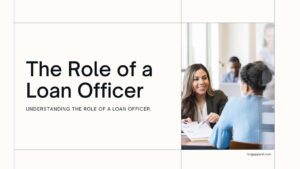To become a loan officer without experience, start by obtaining a relevant degree or certification in finance or a related field. Then, pursue internships or entry-level positions in banking or finance to gain practical experience and industry knowledge.
Introduction
Embarking on a career as a loan officer without prior experience may seem daunting, yet it is entirely feasible with the right approach. This journey begins with a solid foundation in education, such as obtaining a degree or certification in finance, economics, or a related discipline. Coupled with a willingness to learn and adapt, aspiring loan officers can seek entry-level positions or internships within financial institutions. These initial steps are crucial, opening doors to practical experience and the nuanced understanding needed to thrive in the lending industry.
Understanding the Role of a Loan Officer
In the intricate finance world, a loan officer’s role stands out as both pivotal and dynamic. These professionals act as the bridge between financial institutions and individuals or businesses seeking loans. A loan officer evaluates loan applications, assessing the creditworthiness of applicants through a detailed analysis of their financial data, including income, credit scores, and employment history. Their decision-making process is crucial, determining who qualifies for loans and under what terms.
Beyond mere evaluators, loan officers are advisors, guiding applicants through the complex landscape of loan options, interest rates, and repayment plans. They play a significant educational role, ensuring clients understand their commitments. This requires a deep understanding of financial products, excellent communication skills, and empathy.
The journey to becoming a loan officer, even without prior experience, is marked by continuous learning and adaptation. As financial markets evolve, so must loan officers, keeping abreast of new regulations, products, and technologies to serve their clients effectively and responsibly.
Educational Requirements
Embarking on a career as a loan officer without prior experience is achievable through a focused approach to education and certification.
High School Diploma or Equivalent
The initial step is obtaining a high school diploma or its equivalent. This essential educational milestone lays the foundational skills in mathematics, communication, and basic financial understanding, which are pivotal for anyone looking to enter the financial sector. It ensures that candidates have the fundamental capabilities to grasp more complex financial concepts down the line.
Higher Education (Recommended but not Mandatory)
While not mandatory, pursuing higher education in finance, economics, or business administration is highly recommended. A degree can provide a deeper insight into financial systems, lending regulations, and economic theories, which are invaluable in loan processing and approval. It significantly enhances one’s analytical and problem-solving skills, making transitioning into a loan officer role smoother for those without direct experience.
Relevant Certifications (Optional)
For individuals needing more formal experience, obtaining relevant certifications can be a critical step. Various financial institutions and professional bodies offer certifications in mortgage lending, financial planning, or specific loan officer training. These certifications not only fill in the knowledge gaps but also demonstrate to potential employers a commitment to the profession and a readiness to perform the duties of a loan officer with competence.
Gaining Relevant Knowledge and Skills
Entering the loan officer profession without prior experience can be a challenging yet rewarding journey, particularly when you dedicate time to gaining relevant knowledge and skills.
Self-Education
Self-education plays a crucial role in this journey. Aspiring loan officers should immerse themselves in finance and real estate literature, online courses, and webinars. Leveraging free and paid resources can significantly enhance understanding of the financial landscape. This includes familiarizing oneself with basic economic concepts, lending practices, and market trends. Engaging in forums and discussion groups can also provide insights and practical advice from experienced professionals in the field.
Understanding Federal and State Lending Laws
A deep understanding of federal and state lending laws is imperative for anyone aspiring to become a loan officer. These regulations govern the lending process, ensuring fairness and compliance in all transactions. Familiarizing oneself with the Truth in Lending Act (TILA), Equal Credit Opportunity Act (ECOA), and other relevant legislation can equip aspiring loan officers with the knowledge to navigate the legal aspects of loan processing and to advise clients accurately.
Familiarity with Loan Types and Financial Products
Knowledge of the various types of loans and financial products available is essential. This includes understanding the differences between conventional loans and government-insured loans (such as FHA, VA, and USDA loans) and the specifics of personal loans, lines of credit, and mortgages. By gaining a comprehensive understanding of these products, aspiring loan officers can better assess clients’ needs, offer appropriate financial solutions, and confidently navigate the complexities of loan approval processes.
Acquiring Practical Experience
To become a loan officer with no experience, acquiring practical experience is essential in understanding the intricacies of the profession and the financial industry.
Internships in Financial Institutions or Mortgage Companies
Embarking on internships at banks, credit unions, or mortgage companies is a powerful way to gain firsthand experience. These opportunities allow aspiring loan officers to understand the inner workings of loan processing, customer service, and financial analysis. Internships provide valuable insights and help build a professional network, which is crucial for career advancement.
Entry-level positions in Banking or Sales
Taking up entry-level positions in banking or sales-related fields can be a stepping stone into the loan officer role. Roles such as bank teller, customer service representative, or sales consultant in financial services equip individuals with a deep understanding of financial products, client interaction techniques, and the fundamentals of the sales process, laying a solid foundation for a future as a loan officer.
Shadowing Experienced Loan Officers
Shadowing experienced loan officers offers a unique learning experience, enabling aspirants to observe the day-to-day responsibilities and challenges of the profession. This practical exposure is invaluable, providing insights into effective client communication, loan evaluation processes, and compliance with lending regulations.
Obtaining Necessary Licenses
For those wondering how to become a loan officer without experience, obtaining the necessary licenses is critical to legitimize your entry into the profession.
Completing Pre-Licensure Education
The journey begins with completing pre-licensure education courses approved by the Nationwide Multistate Licensing System (NMLS). These courses cover essential topics such as federal and state mortgage laws, loan officer ethics, and mortgage origination. This educational requirement ensures that all aspiring loan officers have a standardized understanding of the industry’s legal and operational frameworks.
Passing the Nationwide Multistate Licensing System (NMLS) Examination
After completing the required education, the next step is to pass the NMLS examination. This comprehensive test assesses your knowledge of the topics covered in the pre-licensure courses, including regulations, mortgage products, and ethical practices. Successfully passing this exam demonstrates your competency and readiness to operate within the field, making it a pivotal milestone for entering the profession as a licensed loan officer.
Obtaining these licenses is essential for compliance and building trust with clients and employers, marking a significant step forward in your journey to becoming a loan officer without prior experience.
Building a Professional Network
For aspiring loan officers without prior experience, building a robust professional network is a strategic step towards career advancement and success in the finance industry.
Joining Professional Associations in the Finance Industry
Joining professional associations offers invaluable opportunities for networking, mentorship, and education. These associations bring together professionals from various areas of finance, including mortgage lending, banking, and financial planning. Membership can provide access to exclusive resources, industry insights, and professional development programs. It also serves as a platform to connect with experienced loan officers and financial advisors who can offer guidance and support as you navigate your career path.
Attending Industry Conferences and Workshops
Participating in industry conferences and workshops is another effective way to expand your professional network. These events are educational and serve as a convergence point for professionals across the finance sector. Attending these gatherings allows you to meet peers, industry leaders, and potential mentors face-to-face, fostering relationships that could lead to job opportunities, collaborations, or valuable insights into the profession of loan officers.
Leveraging Social Media Platforms like LinkedIn
In today’s digital age, platforms like LinkedIn are crucial in professional networking. Creating a compelling LinkedIn profile highlighting your education, skills, and aspirations can attract the attention of industry professionals. Engaging with content, joining finance-related groups, and actively participating in discussions can further enhance your visibility and connections in the industry. This digital networking strategy is particularly beneficial for those without direct experience, as it provides a means to demonstrate your commitment to the field, share your journey, and interact with potential employers or mentors.
Applying for Loan Officer Positions
Navigating the path to becoming a loan officer with no experience can culminate effectively with a strategic approach to applying for positions in the field.
Crafting a Strong Resume and Cover Letter Highlighting:
Creating a compelling resume and cover letter is crucial in catching the eye of potential employers. Highlight relevant education, certifications, internships, and transferable skills such as customer service, analytical abilities, and sales experience. Emphasize your eagerness to learn and adapt, demonstrating how your background, even if not directly related, equips you with a unique perspective and skill set beneficial to the loan officer role. Tailoring your cover letter to each application by mentioning how you can address the employer’s specific needs or the position’s peculiarities can set you apart from other candidates.
Searching for Job Openings:
Leverage job search platforms, company websites, professional networks, and associations to find loan officer positions. Utilizing filters to narrow down opportunities that welcome entry-level applicants or those with related experience can streamline the search process. Keeping an open mind about starting in roles that may serve as stepping stones to becoming a loan officer, such as assistant or support positions in financial institutions, can also be an intelligent strategy.
Preparing for Interviews:
Preparing thoroughly for interviews is crucial to making a solid impression. Research the hiring institution and understand its culture, products, and the specifics of the loan officer role within that context. Articulate how your background, education, and indirect experiences make you a suitable candidate. Practising responses to common interview questions, especially those that explore your motivation, understanding of the financial industry, and how you handle customer interactions, will boost your confidence and readiness to engage effectively with potential employers.
Continuous Professional Development
The journey to becoming a successful loan officer, especially without prior experience, does not end with securing a position. It evolves through continuous professional development, ensuring you remain competitive and proficient.
Staying Updated with Industry Trends and Regulations
The financial industry is dynamic, with regulations, trends, and market conditions changing regularly. Staying abreast of these changes is crucial. Regularly reading industry publications, attending webinars, and participating in relevant forums can keep you informed. This knowledge helps you make informed decisions and positions you as a knowledgeable resource for clients and colleagues.
Seeking Advanced Certifications or Designations
As you gain experience, seeking advanced certifications or designations becomes a pathway to further your expertise and credibility. Certifications like the Certified Mortgage Banker (CMB) or completing programs through the Mortgage Bankers Association (MBA) can distinguish you in the field. These credentials reflect a deep commitment to the profession and an elevated level of knowledge that can enhance your career trajectory.
Pursuing Further Education, if Necessary
In some cases, furthering your formal education with a bachelor’s or master’s degree in finance, business administration, or a related field can open up advanced opportunities. This step might be particularly beneficial for those who entered the profession with minimal formal education, providing a deeper understanding of business practices, economic theory, and financial analysis.
Engaging in Peer Learning and Networking
Continuously engaging with your peers through networking events and professional associations can offer insights into best practices and new perspectives. Peer learning opportunities like case studies and collaborative projects can enrich your professional experience and enhance your problem-solving skills.
Embracing Technology and Innovation
The loan industry is increasingly influenced by technology, from digital applications to fintech innovations. Embracing these changes by learning about new technologies and software can streamline processes, improve customer experiences, and keep you at the forefront of industry advancements. This proactive approach to professional development ensures that you remain a valuable, adaptable, and forward-thinking loan officer.
FAQs
Is it possible to become a loan officer without finance experience?
Yes, starting with a solid educational foundation and obtaining the necessary certifications can enable you to become a loan officer without prior finance experience.
What initial steps should I take towards becoming a loan officer?
Focus on acquiring a high school diploma or equivalent, consider further education in relevant fields, and gain a basic understanding of the lending industry.
Do I need a college degree to be a loan officer?
A college degree is beneficial but optional. Relevant experience and certifications can also lead to a career as a loan officer.
How crucial are certifications in this career path?
Certifications are essential for acquiring knowledge and becoming licensed. They are often required to start your career as a loan officer.
Can internships accelerate my journey to becoming a loan officer?
Internships provide practical experience and networking opportunities, making them highly valuable for aspiring loan officers.
How can I maintain competitiveness in the loan officer field?
Stay informed about industry changes, pursue advanced certifications, continuously learn, and utilize networking and technology to enhance your career.
Conclusion
Embarking on the journey to become a loan officer with no experience is a challenge that can be successfully navigated through dedication to education, obtaining necessary certifications, and embracing practical experiences. By leveraging internships, entry-level positions, and continuous professional development, aspirants can build a solid foundation for a fulfilling career. Key to this path is the commitment to learning and adapting, ensuring that one remains competitive in the evolving landscape of the financial industry. With perseverance and strategic steps, transitioning into a loan officer role without prior experience is not only possible but promising.














